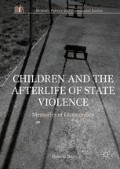Abstract
This chapter describes the historical and social conditions that shape cultures of fear. Highlighting the pervasiveness of state violence, the chapter reflects on what an encounter with state violence meant for the children of Pinochet era and how it has left traces in the landscapes of intersubjective life until today. In this chapter, I show how the politics of fear promoted by Pinochet’s regime through state terror was accompanied by an increasing fear of the Other which permeated social life in post-coup Chile and helped to shape the family as a place invested of feelings of loyalty and tension, in the face of a threatening Other. I present one of the several paradoxes attached to cultures of fear and the complexity of its experiences: at the same time as the culture of fear dispossess individuals of their sense of dignity, the presence of fear or the sense of threat is normalized and absorbed into forms of everyday life.
Access this chapter
Tax calculation will be finalised at checkout
Purchases are for personal use only
Bibliography
Chambers, R. (2002). Orphaned memories, forster-writing, phantom pain: The Fragments affair. In N. K. Miller, N., & Tougaw, J. (Ed.), Extremities: Trauma, tetsimony and community. Champaign: University of Illinois Press.
Constable, P., & Valenzuela, A. (1993). A nation of enemies: Chile under Pinochet. New York: W.W. Norton.
Corradi, J., Weiss, P., & Garretón, M. A. (1992). Fear at the edge state terror and resistance in Latin America. Berkeley: University of California Press.
Das, V. (2007). Life and words: Violence and the descent into the ordinary. Berkeley: University of California Press.
Eyerman, R. (2001). Cultural trauma: Slavery and the formation of African American identity. Cambridge: Cambridge University Press.
Feitlowitz, M. (1999). A lexicon of terror: Argentina and the legacies of torture. New York: Oxford University Press.
Freud, S., & Gay, P. (1995). The Freud reader. New York: W.W. Norton.
Gómez-Barris, M. (2009). Where memory dwells: Culture and state violence in Chile. Berkeley: University of California Press.
Gordon, A. (2008). Ghostly matters: Haunting and the sociological imagination. Minneapolis: University of Minnesota Press.
Green, L. (1999). Fear as a Way of Life. New York: Columbia University Press.
Hoffman, E. (2004). After such knowledge: Memory, history, and the legacy of the holocaust. New York: Public Affairs.
Hoffman, E. (2010). The long afterlife of loss. In Radstone, S., & Schwarz, B. Memory: Histories, theories, debates (pp. 406–415). New York: Fordham University Press.
Lechner, N. (1992). Some people die of fear: Fear as a political problem. In J. Corradi, P. Weiss, & M. A. Garretón (Eds.), Fear at the edge. State terror and resistance in Latin America. Berkeley: University of California Press.
Lira, E., & Castillo, M. I. (1991). Psicología de la amenaza política y del miedo. Santiago: Instituto Latinoamericano de Salud Mental y Derechos Humanos.
Lira, E., & Castillo, M. I. (1993). Trauma Político y Memoria Social. Psicología Política, 6, 95–116.
Perelli, C. (1992). Youth, politics and dictatorship in Uruguay. In Corradi, J., Weiss, P., & Garretón, M. A. Fear at the edge. State terror and resistance in Latin America (pp. 212–235). Berkeley: University of California Press.
Robben, A. (2011). Political violence and trauma in Argentina. Philadelphia: University of Pennsylvania Press.
Sémelin, J. (2007). Purify and destroy: The political uses of massacre and genocide. New York: Columbia University Press.
Stern, S. J. (2006a). Battling for hearts and minds: Memory struggles in Pinochet’s Chile, 1973–1988. Durham, NC: Duke University Press.
Wilkinson, D. (2004). Silence on the mountain: Stories of terror, betrayal, and forgetting in Guatemala. Durham, NC: Duke University Press.
Author information
Authors and Affiliations
Copyright information
© 2016 The Editor(s) (if applicable) and The Author(s)
About this chapter
Cite this chapter
Jara, D. (2016). The Culture of Fear and Its Afterlife. In: Children and the Afterlife of State Violence. Memory Politics and Transitional Justice. Palgrave Macmillan, New York. https://doi.org/10.1057/978-1-137-56328-6_2
Download citation
DOI: https://doi.org/10.1057/978-1-137-56328-6_2
Published:
Publisher Name: Palgrave Macmillan, New York
Print ISBN: 978-1-349-94852-9
Online ISBN: 978-1-137-56328-6
eBook Packages: Political Science and International StudiesPolitical Science and International Studies (R0)

